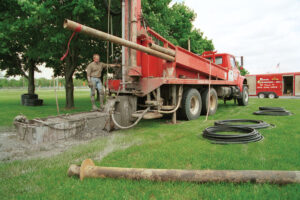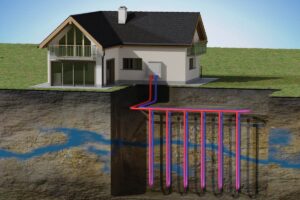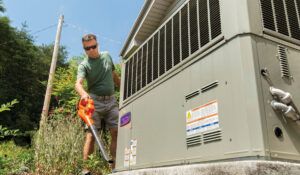 In your years as a homeowner, you have probably bought and sold a few homes and maybe even built one or two. When it came time to replace your outdated furnace and air conditioner, or you had to decide on what kind of heating and cooling system to put in your new home, I’ll bet geothermal or air source heat pumps came up in the conversation.
In your years as a homeowner, you have probably bought and sold a few homes and maybe even built one or two. When it came time to replace your outdated furnace and air conditioner, or you had to decide on what kind of heating and cooling system to put in your new home, I’ll bet geothermal or air source heat pumps came up in the conversation.
As you may know, geothermal draws heat from the earth to heat your home while an air source heat pump gets its heat from the outside air. The one thing they have in common is both are heat pumps. According to Webster’s Dictionary, the definition of a heat pump is: “an apparatus for heating or cooling (as a building) by transferring heat by mechanical means from or to an external reservoir (as the ground, water, or outside air)”. In fact, everyone reading this article has a heat pump in their home. By definition isn’t a refrigerator a heat pump? Does it not move heat from one place to another using a mechanical means? Yes, it does. The difference is the refrigerator does not have a reversing valve, so it cannot move heat from your home and put it into the refrigerator.
All heat pumps work thanks to the second law of thermal dynamics that states, “Heat always flows from high to low, never in reverse.” Even though it’s winter and cold outside, when you expose a refrigerant coil to the even colder outside air, heat will flow from the cold outside air to the even colder refrigerant (remember the second law of thermal dynamics). This heat absorbed by the refrigeration cycle is then pumped into your home.
Now that you know the operating principles of a heat pump, which system is best, geothermal or an air source heat pump? The earth has a more consistent heat sink than the outside air. According to the Department of Energy, “ground source heat pumps have efficiencies of 300- 600 percent on the coldest winter nights, compared to 175-250 percent for air source heat pumps on cool days.”
How can something be more than 100 percent efficient? If you heat your home with gas, you get about $.60 to $.95 of heat for every dollar you spend on gas – $.05 to $.40 went out the flue. With a geothermal heat pump, for every dollar you spend on electricity to operate the system, you get $3 – $6 worth of heat that comes from the earth. You can apply this same logic to the air source heat pump.
A word of caution – if you are looking to install a heat pump into your home because you have high monthly utility bills and comfort issues, please look at how your home is performing first. A heat pump cannot make your cold floors warm and stop drafts. Have an energy evaluation done on your home first. A qualified professional can look at your insulation and perform a blower door test. Then, air seal and insulate your home as needed before having the heat pump installed because your installer will be sizing your heat pump to the heat loss of your home. Making the improvements to your building shell may save you money on the geothermal installation.

For more information on geothermal and to learn more about the 30 percent Tax Credit go to www.gaoi.org (Geothermal Alliance of Illinois) or call 217-241-7973 and talk with my good friend John Freitag to answer all of your geothermal questions. You do not want to have your system installed by someone still learning about geothermal. The GAOI website lists all of the GAOI accredited contractors in Illinois that have one, or all three, GAOI accreditations: Installer Technician, Service Technician or Loop Installer.
Illinois Renewable Energy Conference includes geothermal
The Illinois Renewable Energy Conference on July 21 at Illinois State University will feature presentations on geothermal and renewable energy technology. Breakout session tracks will focus on policy, technology and case studies specifically for wind, solar, biomass, geothermal and energy efficiency. Visit www.RenewableEnergy.ilstu.edu for more information.









